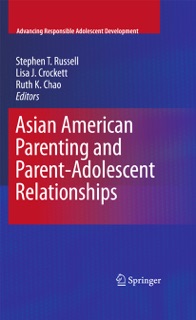The growing presence of non-European cultures in America brings new challenges to as well as opportunities for parenting research. Whereas particular constructs of parent-child relationships were once considered universal, we now recognize distinct cultural variations. This is especially true in the case of Asian Americans, a population encompassing many diverse ethnicities.
Informed by a variety of qualitative and quantitative methodologies including detailed surveys of teenagers and their parents, Asian American Parenting and Parent-Adolescent Relationships focuses on Chinese and Filipino Americans—large populations with markedly different histories and cultural influences—giving readers a new lens into the nature and meaning of cultural differences in parenting. Synthesizing data on adolescent autonomy and dependence, parental support and control (both crucial to adolescents’ wellbeing), and the rarely-explored concept of parental sacrifice, this ambitious volume:
Compares the parental belief systems of European Americans and immigrant Chinese and their influence on parenting styles.
Discusses the role of measurement equivalence in understanding Asian American parenting practices.
Examines sacrifice as a central concept in Asian American parenting and in immigrant parenting in general.
Analyzes how Asian American teenagers understand the support and control provided by their parents.
Explores the dynamics of parent and child gender in Asian American parenting.
Places these findings in the context of previous parenting research and identifies new directions for the field.
Asian American Parenting and Parent-Adolescent Relationships is a uniquely informative reference for researchers, clinicians, and graduate students across multiple disciplines, including developmental, clinical child, and school psychology, sociology, and anthropology as well as ethnic and women’s studies.
"A much needed and extremely thoughtful contribution to the scholarship on Asian American families. The authors rely on a variety of research methods to reveal patterns that challenge stereotypes and urge us to move beyond pan ethnic categories and explore the rich diversity among Asian Americans. This book is an exemplary study of culture and parenting."
– Niobe Way, President, Society for Research on Adolescence /
Professor of Applied Psychology, New York University


